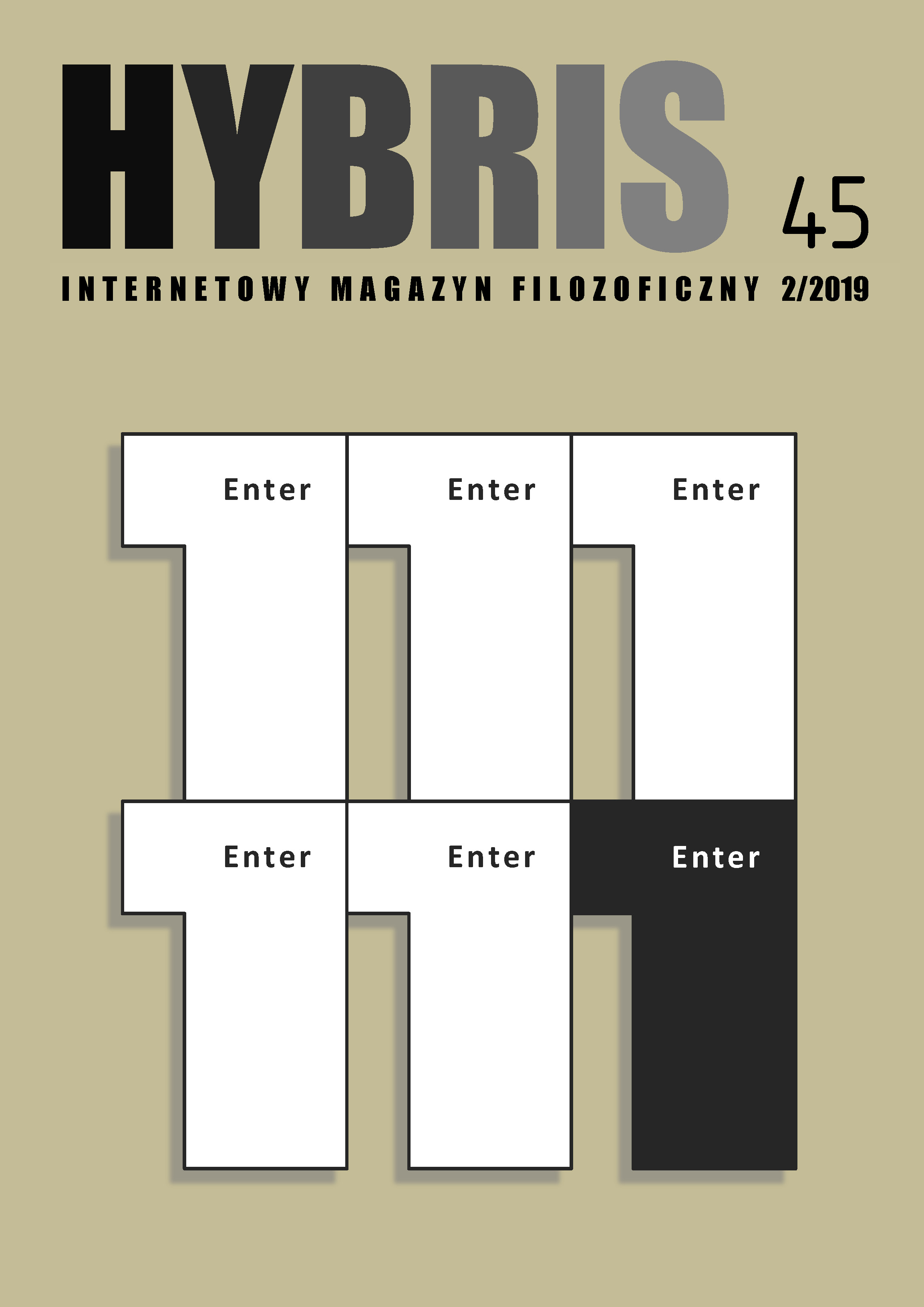The broken life in Dostoevsky’s "Notes from the Underground"
DOI:
https://doi.org/10.18778/1689-4286.45.04Keywords:
the underground man, normal life, modernity, evil, freedom, faithAbstract
This article is dedicated to a philosophical interpretation of Dostoevsky’s Notes from the Underground. In contrast to the existential interpretation proposed by Shestov (in Philosophy of tragedy) the author defends the thesis that Dostoevsky’s novel has to be interpreted from the perspective of modernity, and the tragedy of his hero, the underground man, has to be interpreted in categories of alienation and inauthentic existence. From that perspective the divide between normal life and underground life expresses the fundamental contradiction of the modern world. The author indicates the proximity between Dostoevsky’s and Kierkegaard’s and Nietzsche’s analyses of modernity. He then shows that Dostoevsky contrasts the arbitrariness of the underground man to a deterministic, scientistic vision of the world and makes it an important premise of his understanding of an authentic existence based on freedom and faith.
References
Besançon, A. (1990). Tołstojewszczyzna. Zeszyty literackie, 30, 79-91.
View in Google Scholar
Bierdiajew, M. (2004). Światopogląd Dostojewskiego. Kęty: Antyk.
View in Google Scholar
Bohun, M. (1996). Fiodor Dostojewski i idea upadku cywilizacji europejskiej. Katowice: Śląsk.
View in Google Scholar
Dobieszewski, J. (2017). Raskolnikow i inni. Kilka filozoficznych refleksji o bohaterach Dostojewskiego, [w:] J. Dobieszewski (red.) Wokół Fiodora Dostojewskiego. Warszawa: Wyd. UW.
View in Google Scholar
Dostojewski, F. (1976). O literaturze i sztuce. Kraków: Wydawnictwo Literackie
View in Google Scholar
Dostojewski, F. (1979). Idiota. Warszawa: PIW.
View in Google Scholar
Dostojewski, F. (1982). Dzienniki pisarza, t. 1-3. Warszawa: PIW.
View in Google Scholar
Dostojewski, F. (1992). Notatki z podziemia (Z dzieł Fiodora Dostojewskiego, t. 1). London: Puls.
View in Google Scholar
Dostojewski, F. (1993). Sentencje. Białystok: Łuk. Dostojewski, F. (2004). Bracia Karamazow. Kraków: Znak. Dostojewski, F. (2010). Biesy. Kraków: Znak.
View in Google Scholar
Gromczyński, W. (1980). Zagadka Raskolnikowa. Z problemów filozoficznej interpretacji postaci Dostojewskiego. Archiwum Historii Filozofii i Myśli Socjologicznej, 26, 315-356.
View in Google Scholar
Jaroszewski, T.M. (1981). Fenomenologia wolności Fiodora Dostojewskiego, [w:] Kułakowska D. Dostojewski. Dialektyka niewiary. Warszawa: Książka i Wiedza.
View in Google Scholar
Jewłampijew, I. (2017). Osoba jako absolut: metafizyka Dostojewskiego, [w:] J. Dobieszewski [red.], Wokół Fiodora Dostojewskiego (93- 119). Warszawa: Wyd. UW 2017.
View in Google Scholar
Kierkegaard, S. (1982). Choroba na śmierć. Warszawa: PWN.
View in Google Scholar
Kierkegaard, S. (2008). Recenzja literacka. Kęty: Wyd. Marek Derewecki.
View in Google Scholar
Kruszelnicki, M. (2017). Dostojewski. Konflikt i niespełnienie. Warszawa: Scholar.
View in Google Scholar
Kułakowska, D. (1981). Dostojewski. Dialektyka niewiary. Warszawa: Książka i Wiedza.
View in Google Scholar
Lazari, A. (1988). „Poczwiennictwo”. Z badań nad historią idei w Rosji. Łódź: Wyd. UŁ.
View in Google Scholar
Nietzsche, F. (2012a). Niewczesne rozważania, [w:] Dzieła wszystkie, t. 1a. Łódź: Oficyna.
View in Google Scholar
Nietzsche, F. (2012b). Narodziny tragedii, [w:] Dzieła wszystkie, t. 1a. Łódź: Oficyna.
View in Google Scholar
Nietzsche, F. (2012c). Notatki z lat 1885-1887 (Dzieła wszystkie, t. 12). Łódź: Officyna.
View in Google Scholar
Nietzsche, F. (2012d). Notatki z lat 1887-1889 (Dzieła wszystkie, t. 13). Łódź: Officyna.
View in Google Scholar
Pieniążek, P. (2010). Schiller/Nietzsche: nowoczesność, kultura, historiozofia. Przegląd Filozoficzno-Literacki, 3(28), 147-170.
View in Google Scholar
Przybylski, R. (2010). Dostojewski i „przeklęte problemy”. Warszawa: Sic!
View in Google Scholar
Rogalski, A. (1960), Rosja Europa. Wzajemne związki, wpływy i zależności kulturalno-literackie. Warszawa: PAX
View in Google Scholar
Schelling, F.W.J. (1990). Filozoficzne badania nad istotą ludzkiej wolności i sprawami z tym związanymi. Kraków: Inter esse.
View in Google Scholar
Schiller, F. (2006). O poezji naiwnej i sentymentalnej, [w:] Dzieła wybrane, t. 1 [red. S. Kaszyński]. Poznań: Wydawnictwo Poznańskie.
View in Google Scholar
Schopenhauer, A. (2004). W poszukiwaniu mądrości życia. Parerga i paralipomena, t. 2. Kęty: Antyk.
View in Google Scholar
Simons, J. D. (1972). The Myth of Progress In Schiller and Dostoevsky. Comparative Literature, 24, 328-337.
View in Google Scholar
DOI: https://doi.org/10.2307/1769460
Sugerman, R. (1980). Rancor against time. The Phenomenology of „Ressentiment”. Hamburg: Meiner.
View in Google Scholar
Walicki, A. (1959). Osobowość a historia. Warszawa: PIW.
View in Google Scholar
Downloads
Published
How to Cite
Issue
Section
License

This work is licensed under a Creative Commons Attribution-NonCommercial-NoDerivatives 4.0 International License.






